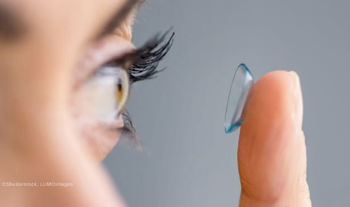
A companion bill to S. 2777 aims to hold online sellers of contact lenses accountable for deceptive or illegal sales tactics that may threaten patient health.

A companion bill to S. 2777 aims to hold online sellers of contact lenses accountable for deceptive or illegal sales tactics that may threaten patient health.

The Food and Drug Administration (FDA) recently brought together representatives from optometry and ophthalmology to discuss regulatory review of contact lenses and future medical devices to control the progression of myopia, primarily in children.

As a profession, we have seen the benefits of transitioning patients to contact lens modalities that are replaced frequently. Innovations in material technologies have allowed advanced designs, including greater oxygen permeability to provide a healthier, more comfortable wearing experience.

Contact lens wearers are dropping out for comfort and vision reasons. Contact lenses can be considered a significant cause of these symptoms if they contribute to an unstable tear film or trigger inflammatory reactions.


The recent news in our profession was an announced partnership between Opternative and 1-800-Contacts.1 With InstaRx powered by Opternative, customers can “stay home, eat some ice cream, and get a vision exam” according to the 1-800 Contacts website.

Keep your patients in safe and comfortable lens wear while on the road

Keep your patients in safe and comfortable lens wear while on the road

In order to properly care for our contact lens patients, we have to take responsibility for the changes that are occurring in the tear film under the lens.

Orthokeratology is a specialty type of contact lens fitting in which the patient wears correction overnight and is free from wearing visual correction during the day. By fitting the patient into a reverse geometry gas permeable lens, the practitioner can make controlled but temporary refractive changes to the cornea. It is a treatment that has been proven to be safe and effective in both children and adults with promising results in the area of controlling myopia progression.

Simple Contacts allows your patients to self report and self prescribe

Contact lenses are increasingly viewed as a commodity, not a medical device, especially in recent years with pressure through legislation from online retailers.

Contact lenses, communications, and knowing how to properly bill and code

Scleral lenses are indispensable in a specialty contact lens practice. The indications for scleral lens use are well established in the literature and range from visual rehabilitation of irregular corneas to severe ocular surface disease management.1-4 Many more uses may still be revealed.

Contact lens practitioners have a range of soft contact lens replacement modalities available-from daily disposable to reusable lenses with a two-week or monthly replacement schedule. Personality, lifestyle factors, and ocular health should all be taken into account when deciding which lens and which lens modality to prescribe.

From the first introduction on the cinematic screens for visual effects in 1950 to its mainstream use today for masking both natural iris pigment and ocular disfigurement, colored contact lenses are an important addition to your contact lens toolbox. Industry has made fitting this type of lens more appealing by offering improvements in color matching techniques and healthier materials compatible with commercially available inks and dyes.

The latest news and research you need to know about this week.

1-800 Contacts is ramping up its fight against organized optometry at the state and federal levels over legislation that would change important aspects of contact lens prescriptions and dispensing, such as longer expiration dates, elimination of contact lens brand on the Rx, and enacting a contact lens patient bill of rights.

Let’s talk about an elephant in the room. Some practices are incredibly effective at selling annual supplies of contact lenses, and some practices are not. Just like daily disposables, low sales numbers are blamed on “the demographics of my practice.”

Mass media and medical publications have been warning for years that the incidence of diabetes is rising rapidly and predicting a “health catastrophe” in which more than 10 percent of the U.S. population would be living with this disease.

Dr. Scott Schachter shares four factors that are affecting contact lens dropout in both a positive and negative way

Contact lens manufacturer representatives discussed the state of the contact lens industry, including consumer education, doctor-patient communication, and legislative battles. Scot Morris, OD, FAAO, posed questions during the Global Contact Lens Forum at Vision Expo East.

Johnson & Johnson Vision Care (JJVC) has discontinued its unilateral pricing policy (UPP) in an effort to focus the company’s resources on strengthening the doctor-patient relationship and advocating against contact lens deregulation. In UPP’s place, JJVC will be launching a new patient rewards program. This change is effective April 13, 2016.

Athletes have many vision challenges, but contact lenses can meet many of their needs on the court, field, or pitch, says Niall Farnon, MCOptom, when he presented at SECO 2016.

As a die-hard University of Kentucky basketball fan, I have watched many, many basketball games throughout my life. During these basketball games, I have cringed at a few of my favorite players because I have seen some of the players drop their contact lenses on the court, pick them up, put them in their mouths, and then put them right back in their eyes!